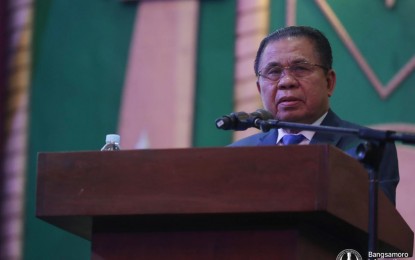From the Philippine News Agency (Mar 25, 2022): BARMM in right direction, says top exec (By Edwin Fernandez)

Bangsamoro Autonomous Region in Muslim Mindanao Chief Minister Ahod Ebrahim. (Photo courtesy of Bangsamoro Information Office – BARMM)
The Bangsamoro Autonomous Region in Muslim Mindanao is heading in the right direction, the region’s top official said Friday.
In a statement, BARMM Chief Minister Ahod “Murad” Ebrahim cited the economic gains of the three-year-old BARMM government in 2021.
BARMM replaced the decades-old Autonomous Region in Muslim Mindanao (ARMM) with the ratification of its basic law, the Bangsamoro Organic Law following a two-part plebiscite held on January 21 and February 6, 2019.
"The region’s economic annual average growth is at par with the national average. In 2020 we recorded -1.9 percent largely because of the pandemic, but this 1.9 percent contraction is the lowest decline among the regions in Mindanao," Ebrahim said.
Ebrahim said the region's economic landscape has significantly changed since 2000.
More balanced economy
Before that year, he said the defunct ARMM was mainly dependent on the agriculture, forestry, and fishing (AFF) sector having 56.4 percent, followed by services with 35.3 percent, and industry with 8.13 percent.
Ebrahim, however, stressed that the numbers have changed in 2020, wherein the service sector, amid the pandemic, has overtaken the AFF with 39.24 percent and 36.18 percent respectively, while the Industry sector is now at 24.58 percent.
He also cited the contribution of the farmers and the fisher folks in moving to a more balanced economy.
"One of the lessons we learned during the height of the pandemic is the importance of agriculture and fisheries in sustaining our basic commodities. Let us not take this key sector of our economy for granted," he said.
He said the latest report from Philippine Statistics Authority (PSA) mentioned that BARMM has recorded a significant decrease in poverty incidence among families over the past three years - from 55.9 percent in 2018 to 39.4 percent in 2021.
Last year, the BARMM also recorded the highest and the only double-digit reduction in terms of poverty incidence in the whole country wherein 365,900 families are poor in the then-ARMM in 2018 and went down to 247, 000 families in 2021.
"We achieved this despite the ongoing pandemic and despite undergoing the difficult transition period,” he said.
“This is indeed a milestone which validates that when all things considered, we are indeed heading into the right direction," he added.
Bigger challenge
Ebrahim said the region is facing a bigger challenge as to how to sustain the momentum and perhaps, more importantly, make the achievement felt by the constituents.
He also noted that in terms of poverty incidence per province from 2018-2021, Lanao del Sur had the most significant reduction from 68.0 to 11.4, followed by Basilan from 65.6 to 46.7, and Maguindanao from 48.6 to 37.1.
Sulu, however, had a slight increase in poverty incidence from 66.7 to 71.9, while Tawi-Tawi recorded an increase of 17.7 to 39.5.
"These figures give us a snapshot of our strengths and areas of improvement. Admittedly, it requires careful analysis to fully appreciate and validate the context and story behind these numbers," Ebrahim said.
On Thursday afternoon, Ebrahim reported the same accomplishments during a regular session of the Bangsamoro Transition Authority (BTA), the provisional lawmaking body of the region.
https://www.pna.gov.ph/articles/1170680

No comments:
Post a Comment
Note: Only a member of this blog may post a comment.